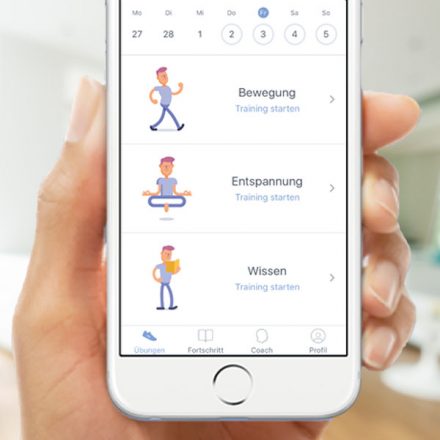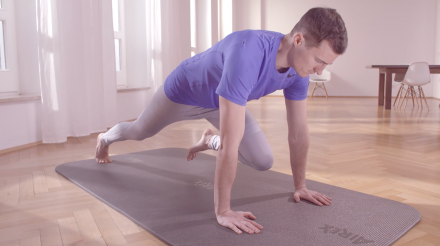Back pain is the most widespread ailment in Germany. Different approaches have been developed to combat the problem. The most effective way to deal with back pain is to adjust everyday routines to deal with the pain while still remaining active. The Munich startup Kaia Health has developed a digital therapy program to treat back pain. For the first time ever, what is known as multimodal therapy is available as an app.
Kaia is not only concentrating on the 80% of Germans who have suffered from back pain at least once during their lifetime. Their target group is also not limited to the 5-10% of the first group who suffer from constant pain. The Munich-based startup is also focusing on companies aiming to tackle the issue of back pain.
Kaia’s founders, Konstantin Mehl and Manuel Thurner, are certainly not newbies on the Munich start-up scene. The duo already established Foodora together. Since completely exiting Foodora this June, they have been able to fully concentrate on Kaia Health, which they already founded in 2016.
Interplay between insurance companies and medical practitioners
The founders had positive experiences with both B2B and B2C marketing with Foodora. Konstantin explained:
“Large firms and insurance companies have approached us because back pain is the #1 cause of absence from work in all industrialized countries. That is unbelievable! Here we are living in a highly industrialized country like Germany, but I am being generous by giving our healthcare system a C- in terms of treating back pain.”
The serial founders consider it an advantage to be a startup since they are able to be a flexible trail-blazer while also seeking out cooperation with the standard medical care system. As an example, Kaia Health is working with AOK Bayern and the Technical University of Munich on a large research project with 5.2 million euros worth of funding.
The gold standard — without waiting or being buried by costs
Together with the Center for Pain Therapy at the Technical University of Munich, the founders have digitized the “gold standard for back pain therapy,” otherwise known as multimodal pain therapy. This type of therapy is an alternative to surgical intervention. However, insurance companies only rarely cover the costs, which are rather expensive at up to 15,000 euros. A patient can also spend up to two years on a waiting list, which makes the Kaia app even more attractive since it lets users get started immediately. Kaia should also be covered by insurance in the future.
Artificial intelligence as the founders’ main focus
Fitness apps are a dime a dozen, and there are already some on the market that focus on back pain. At first, Kaia does not seem much different from the others: a holistic training program is provided each day that includes general education, mindfulness practices and physical exercises.
We asked founder Konstantin how their startup stands out from the competition:
“Worldwide, we are the only service provider to offer a gold standard for back therapy as our medical USP. We also offer a technical USP, which is the integration of artificial intelligence. Manuel and I are working almost exclusively on our ‘AI lab’.”
Artificial intelligence as the eyes and brain of the digital physical therapist
These technical innovations are what give fitness app users a whole new range of options: movement tracking on a smartphone, or the ‘therapist’s eye,’ makes it possible to improve physical exercises in real time.
Thanks to artificial intelligence (AI), the ‘therapist’s brain’ knows the best way to organize the exercises based on each patient’s medical history and exercise performance. Customers, such as large insurance companies, also benefit from Kaia’s ‘AI lab.’
Another advantage in terms of product development is undoubtedly that Konstantin knows exactly what he is talking about: he let us know that his back is his “weak spot” and said:
“We are essentially building an app for me so I won’t have to go to the doctor all the time. I am fully committed to Kaia because I’ve noticed that it has helped me and that the exercises keep my back pain at bay with relatively little effort.”
He narrowly avoided needing spine surgery a few years ago thanks to multimodal therapy. The young entrepreneur now actively uses Kaia 3-4 times a week, for example after a long car drive.
Is the German market ready for digital health startups?
Kaia Health aims to put more than just a fitness app on the market. The founders see themselves more as a digital pharmaceutical company, and that is something the German healthcare market has not widely accepted yet. Konstantin described the situation:
“There are excellent physicians in Germany who are trying to introduce offers to the market that are medically valid. Then you have another group, internet entrepreneurs, who are creating fitness apps. The combination of the two is what is missing.”
Investors often mistake Kaia for a fitness app and oversimplify the company to being ‘like Freeletics for back pain.’ The situation is different in America, Asia and other European countries. The founder added:
“Other countries have digital health investors with a profound understanding of the sector. They view us as more of a pharmaceutical company, but instead of pills, we develop apps. The same investors also know we conduct clinical studies and that data protection is important to us. The investors naturally also understand that we need a lot more money and time to establish a digital therapy company when compared to a fitness or wellness company.”
Nonetheless, the Munich startup completed its first round of seed funding with 720,000 euros last year. Their collaboration with other consortium partners in the 5.2-million-euro project funded by the federal committee should also not be forgotten.
You do not get far just as a wellness app
Medtech startups can have a difficult time gaining recognition as a medical product. Yet the founders handled the situation with flying colors thanks to external advisors and their physician in the team – Dr. Stephan Huber as Chief Medical Officer. That being said, a lot of work is still necessary.
Konstantin elaborated on the obstacles faced during certification and why it is still worth it:
“It obviously has a major effect on our product development process by slowing it down and requiring more documentation. But we have made it our mission to develop digital therapy programs, and you do not get very far just as a wellness app. We also run clinical studies and work with insurance companies. None of that would be possible without the necessary CE certifications.”
Major leaps? They are more likely abroad in the eHealth sector
When asked about the biggest current challenge, the experienced founder communicated that they are currently grappling with the difficult question of how long Kaia Health should stay in Germany, or if they should stay at all. Ultimately, the Asian and US markets are significantly more mature in terms of digital therapy. Kaia already has an office in Boston, one of the most important cities in the US when it comes to medicine. The US office has received a notable number of inquiries from large companies. An Asian investor is also on board, and several pilot projects are on the horizon.
If you want to scale quickly, you need happy users!
With Foodora, Manuel and Konstantin already demonstrated how a startup can gain momentum. So we wanted to know if they are planning the same rapid expansion with Kaia. Konstantin explained:
“If we want to scale Kaia quickly, continuous product improvement is key. On average, every individual knows roughly five people who also suffer from back pain. That means that if we make our current users extremely happy, our growth will be tremendous.”
Success factor: team
So that is what the founders are specifically focusing on at the moment. That along with the never-ending issue faced by all Munich startups: finding good employees. After all, a successful company needs both a good product and a good team. In Konstantin’s words:
“A world-class team that gives their all. That means: none of the team members should only half-heartedly share our vision. Every Kaian has to be 100% on board with our mission.”
We certainly hope that the current 18 employees successfully continue their mission to fight back pain. We would also like to see the German market become more receptive to eHealth innovations, both in terms of legislation and investor openness.





